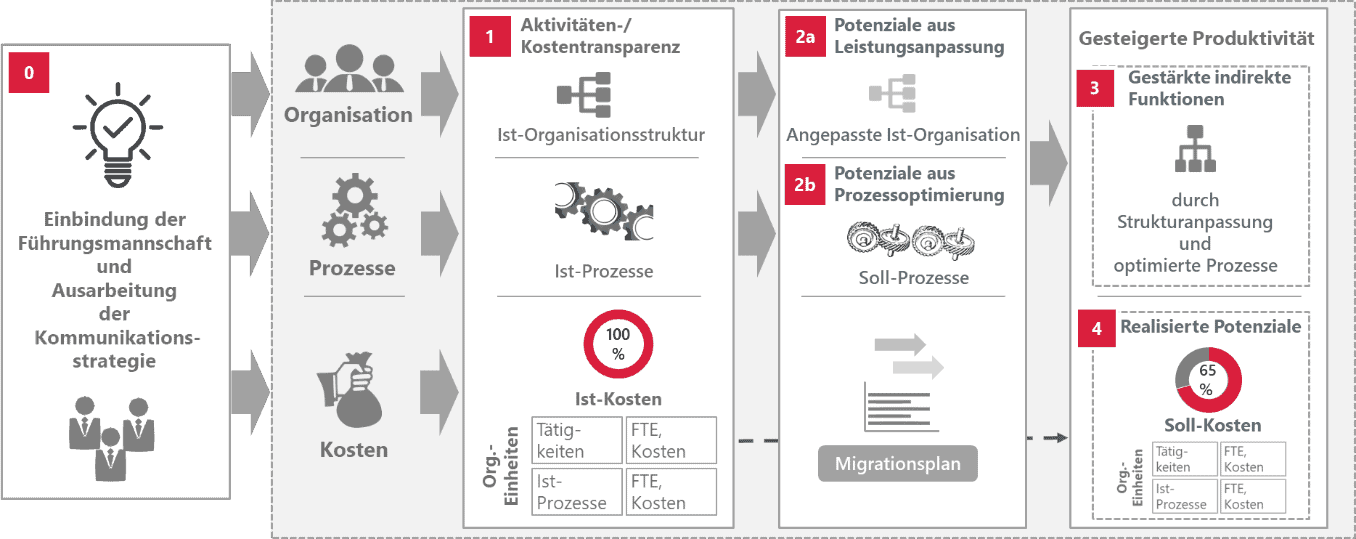TARGUS has received several awards for exemplary project work in the past two years. For good reasons.
Read the case study: In view of the consistently good business in recent years, many a company has developed an administrative fat cushion that is now having a significant impact on costs. Together with TARGUS, a European market leader in the field of metal processing has managed to trim back the ramped-up capacities in the indirect/administrative area to efficiency. This company is an example of a large number of successfully implemented projects to reduce overhead costs in combination with a basic renovation of the administrative core processes.
As much as necessary, as little as possible
This must be the standard for all activities of a company that do not directly create value. But where is what too much or too little and what is the “right” measure at which point? A long-standing TARGUS customer, European market leader in the field of metal processing, was confronted with exactly this question in its core business: In a largely saturated market with increasing competitive pressure from the Asian region, cost efficiency in administration urgently needed to be put to the test in order to continue to be successful in the market. The project result: real customer benefit. The successful transformation of the organisation was achieved with a mobilising approach. The first illuminating insights already came to light by creating real transparency for the entire overhead area for the first time. Together with the client teams, potentials in the double-digit percentage range were then identified and immediately implemented.

Fig.: Streamlined organisation with significantly lower costs and optimised processes
The scope and intensity of the four project steps or building blocks differ individually depending on the company and the initial situation. However, it is always important to closely involve management and employees in the development of the concept.
Perceived “peace” in the workforce
As part of the project preparation, a common understanding was first developed with the management about the areas to be included, the goals and the procedure. The agreement of a corresponding communication concept was also very decisive for success, and its stringent logic for necessity clearly promoted acceptance. This also applied to the social partners and their early involvement, which ensured the continuation of the “peace” in the company and made the timely implementation possible in the first place. The task and process evaluation first created a quantitative quantity structure and an understanding of the concrete processes in the departments under consideration. Through the experience of the consultants and a large number of personal interviews, potentials were quickly identified and compared with the overall project goal. A key success factor was to derive concrete improvement measures that could be verified by the social partners (e.g. the abolition of controlling reports that were no longer needed or further automation in payroll accounting) from the prioritised potentials. This was ensured through a large number of smaller workshops: Each measure contained a concrete description of the target state including its monetary evaluation and firmly agreed milestones for implementation by the respective responsible persons. Based on the large number of measures and interface topics, responsibilities for tasks or processes are often adjusted. Therefore, such a project is often accompanied by a reorganisation of the organisational structure. A prerequisite for the successful implementation or implementation controlling was a catalogue of measures including potential ramp-up and coordinated schedules. For this purpose, TARGUS used a clear and easy-to-use online tool that quickly convinced the employees involved – as well as the newly developed, customised organisational and process structure.
Methodology experts with industrial experience
At TARGUS, implementation is part of the DNA: Targonauts, as the consultants at TARGUS are called, are not content with creating clever charts and presentations and making recommendations to the management. Together with the client’s staff, they implement the ideas and improvement concepts until everything works according to plan. Admittedly, this ability requires corresponding methodological expertise and practical experience on the part of the consultants. Therefore, most Targonauts have a degree in science or engineering, and many gained significant professional experience as line managers in industry, for example as plant managers, before becoming consultants.
Social skills for coaching support
Doers are in demand, i.e. people who burn to actively implement concepts together with the client, who have an eye for the essentials and get down to business quickly, without distracting the team. In this way, the Targonauts are seen as “helpers” (customer quote) in the project. In the case described above, the project and practical experience of the TARGUS consultants also played a decisive role. They not only got involved in the analysis and developed a detailed roadmap for the implementation together with the management and staff – tangible measures with clear responsibilities and binding deadline commitments. They also operated as part of the implementation team and set the pace for the staff to follow.


